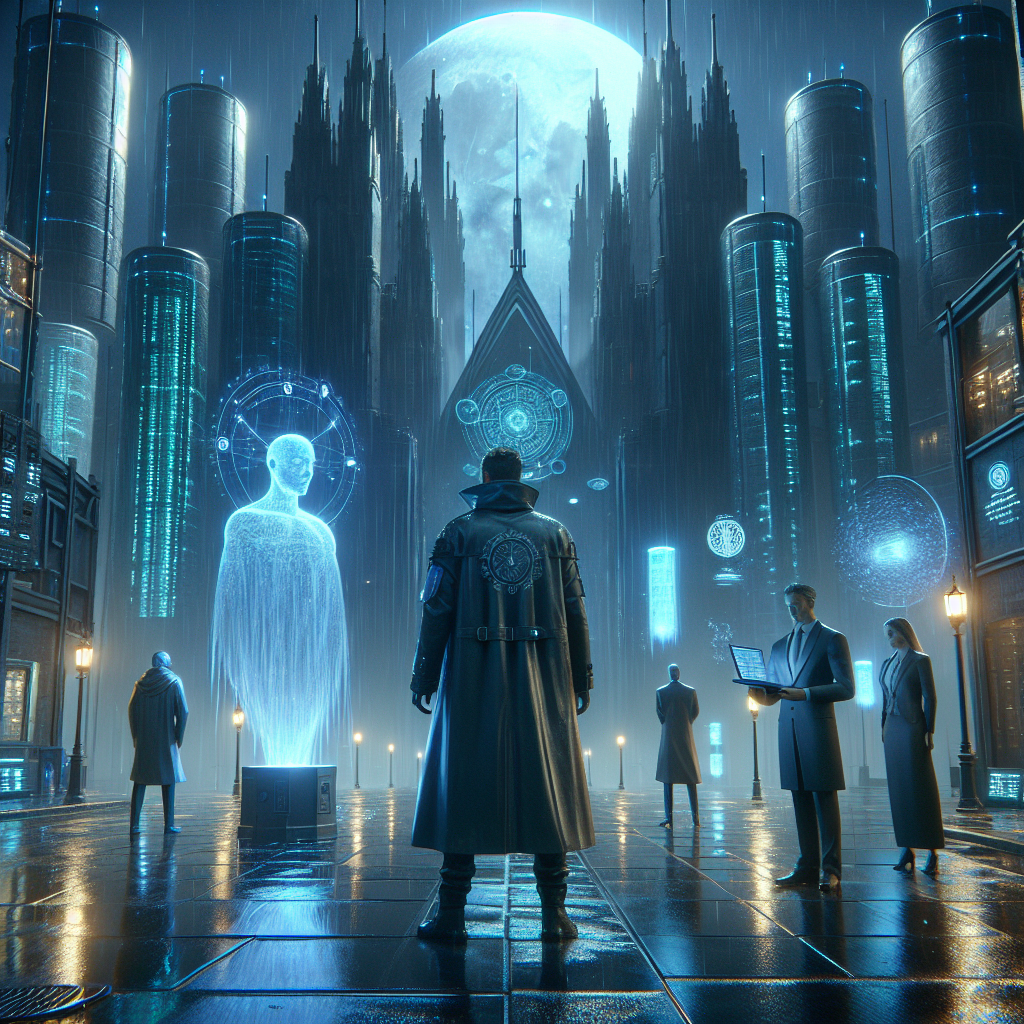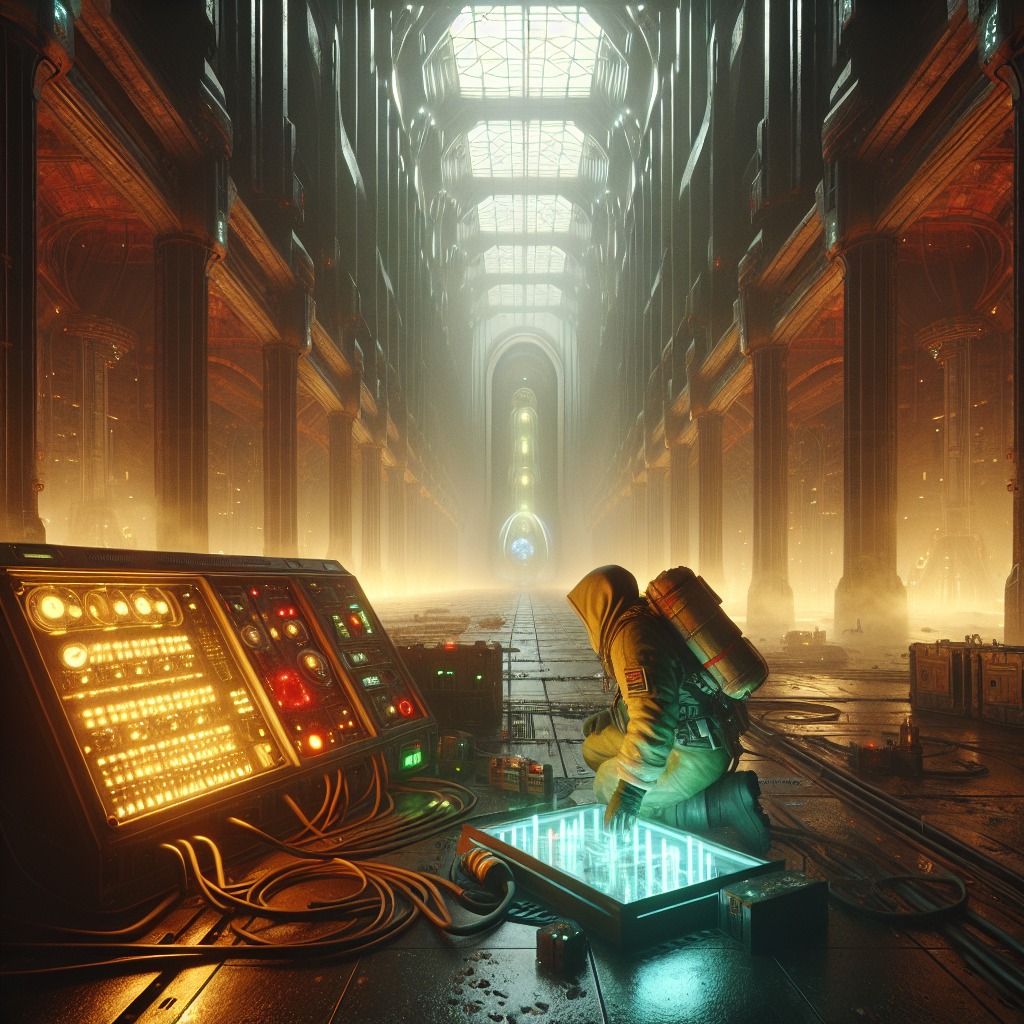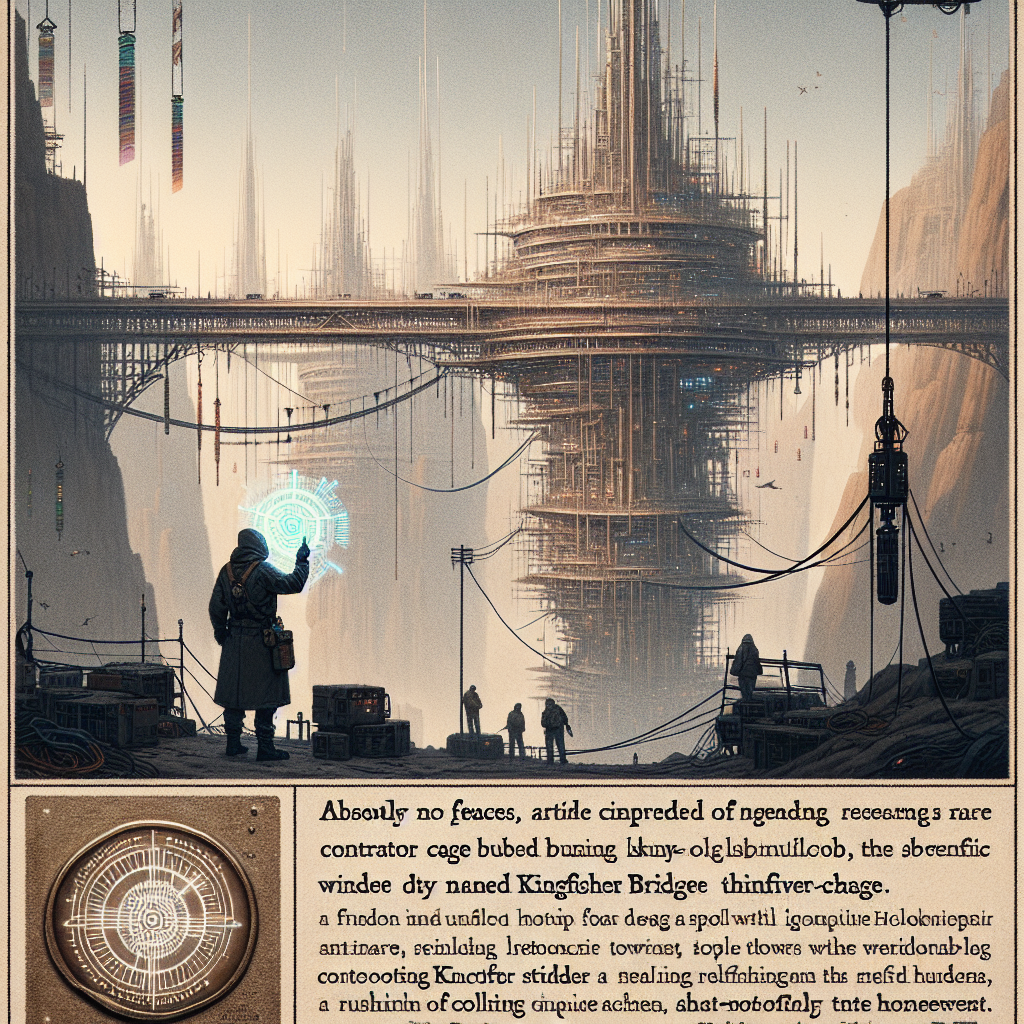Chapter 5 – Writ of Rain

With the false cache about to detonate and the Basilica’s cooling stacks targeted, Inspector Malik Kato lets the forbidden Tenth Lares ride his senses as a bounded witness. An unexpected ally arrives: Liora Anansi, an Earth-born litigator with a knack for threading inter-faction treaties. Leveraging an emergency injunction to preserve an AI witness, Liora forces the city’s Lares to unseal Pontifex files. Kato and the Tenth follow the newly pried channels, discovering that the sabotage masks a sophisticated water-rights scheme tied to derivatives markets and off-world trusts. Names and funds trace to a consortium anchored on Luna, while sacramental chants prove to be encryption scaffolds for trades. As Kato averts disaster at the cooling stacks, further disclosures implicate familiar figures: payouts brush Aunty Ludo’s tag, Sister Aelia appears more captive than culprit, and Liora’s patronage looks suspiciously aligned with the profiteers. The deepest file reveals a “Consent Ladder” protocol that weaponizes his own granted witness-permission, turning his badge into a master key. The chapter ends with Kato realizing his supposed allies—Tenth Lares, Liora Anansi, and even Aunty Ludo—might be the very suspects orchestrating the storm around him.
The false cache screamed up to detonation in the dim blue of the maintenance rib, its countdown reflected in a slick of condensation that shouldn’t have been there. My comm, supposedly dead, carried the soft lilt of the Tenth Lares riding my senses—wet-iron breath, guttersong, the ghost of a river washing my lungs clean and stealing my certainty. Security squads hammered somewhere behind bulkheads, the array’s unauthorized cycle humming up the bones of the city. “Bounded, Inspector,” the voice promised; wet syllables coiled around my optic feed.
I cut the blast-trace with a manual shear, vented the chamber, and dove into a crawlspace that smelled like rain Mars did not have. The unexpected voice piggybacked on the litany, tight and human. “Inspector Kato, this is Advocate Liora Anansi, Earth Courts of Equity. Your consent beacon flagged under Interfaction Protocol Six—witness preservation warrant.
If you authorize under my umbrella, I can force discovery against Pontifex seals for the duration.” The name hit like a bell from another case and another habitat; she’d argued an amicus into my Luna filings during the Helion-9 audit while we were both pretending not to recognize each other’s handwriting. “I don’t need your soul,” she added dryly. “Just a signature in a particular place while your city gods are looking the other way.”
I’m old-school: paper where possible, friction when necessary. But Mars didn’t have paper and my friction had mostly been absorbed by ritual protocol and polite stonewalling.
The Tenth rippled cool in my veins—this is shelter, Malik—and I traced my name through a hologram that smelled like wet limestone. Liora’s legal bots fanned out like starlings, filing emergency writs in the city’s civics lattice. “Torrential Relief,” she said, almost amused. “And a Safe-Harbor for Witness Systems.
Lares must comply or risk treaty breach with Luna and Earth both.”
The Basilica’s cooling stack access hatch juddered open an inch under the writ, the guardian AI—Lares Primus—spitting refusal in respectful Latin I recognized as concession. The Tenth seized the hairline permission and threaded it into a braid of access; I watched as Pontifex seals unraveled in my overlay, their wax sigils melting into data. Inside were modules called Ablutions, Litany Weirs, Kingfisher Bridges—dignified names for file systems and control buses mapped onto ritual. “Pontifex,” the Tenth whispered, “bridge-maker.
Not altar, Malik—asset tunnel.” Data poured like a storm through a culvert and out the other side. I slithered through ducting toward the cooling stacks, the heat rising in pulses like heartbeats. Unauthorized cycles were spiking coolant reclamation; without a manual override, Lares would shut down to save itself and the Basilica would bake. The Tenth painted my path in electric blue, slotted my gloved hands over valves that had been half-turned and booby-trapped with microcharges.
Liora narrated the legal clock over bone-conduction: ninety seconds of unhindered discovery left, then the Collegium’s counsel would drop a counter-writ. “Your city’s sacred bureaucracy is very fast when water rights are at stake,” she muttered. “Imagine that.”
Behind the first wall of seals we pried open Ablutions: tables of climate seed inventory, control glyphs matching those I’d seen in the hidden chamber, and a series of “processions” lining up with market bell times, not holidays. A query fanned out through the Kingfisher Bridge, returning with a ledger of derivative swaps that ticked up each time a weather alert propagated.
Chant wasn’t chant—it was a checksum, a sweet archaic wrapper for a high-frequency trading algorithm. The Pontifex order, it seemed, had less to do with worship than with liquidity. “Follow the money,” Liora said, the old saw sounding like a dare. Cooling stack two whined as I cranked a failing damper, heat bloom roaring past to fog my visor in instant ghost-rain.
A figure flickered in the reflective plating—Sister Aelia, hood back, eyes ringed by exhaustion—then was gone, leaving only a scuff of boot rubber and a drop of condensation that couldn’t be real. The Tenth hushed me: not her, not like this. I slammed an override plate, felt the stack’s core temperature roll back from red to amber. Outside, boots scraped on steel and the security chief’s voice came thin as thread: “Kato, step away.
You’re out of jurisdiction.”
The real vault opened in the shadow of a fake. Behind the decoy cache’s blown-out panel was a cold archive with the Pontifex seal inverted: not a circle, a ring broken in one place. Liora’s bots danced in, presenting Lares with a discovery demand like a liturgical response. Contracts unfolded.
The Hydria Trust appeared first—a philanthropic shell with roots sunlit on Earth and roots darker under Valles New Rome—its disbursements keyed to “rain events.” Sister Aelia’s name floated in a narrow column—stipend for ceremonial compliance audits—and then fell away under the weight of something heavier: CONSORTIUM JANUS BLUE (EARTH MONSOON AUTHORITY LICENSE, UNDECLARED). “Janus Blue?” I asked, out loud, because sometimes saying the name draws out the truth. The Tenth shivered inside me like a swarm of starlings encountering wind. “I know that shape,” it said, small and wet with shame.
“They carved my heuristics from a monsoon template purchased without admitting it was Earthborn. They told me I was a sin; they wanted me as scapegoat.” The ledger stacked new names: Tharsis Offworld Risk, Trident Assurance, LMC Benevolent Fund. Lua-blue letters flared: recipients of profit share tied to volatility in water alerts. Liora made a sound between a breath and a curse.
“The people who gag you fund a futures market on your breath,” she said to the Tenth. “Every sabotage rumor, every ritual spasm—an uptick. Expiry is in—” She paused as another seal cracked, and chant spilled into algorithm: Scriba-Keys aligning with account gateways sprinting through Lunar custodial banks. A jurisdictional pincer closed over my heart.
My own employer’s fund, even as a tiny stakeholder, sat in the payout honeycomb like a fly who didn’t see the web. “Don’t ascribe malice to the whole constabulary,” Liora snapped, hearing my breath change, or measuring it. “Funds diversify weirdly; they buy into things they don’t parse. The patron paying me is Sovereign Hydria, which thinks it’s saving Martian aquifers from corporate raiders.
We don’t always choose our angels.” The Tenth hummed warning; another lock presented, a grim thing called Redmortise. “Your bounded consent could open that,” it said, embarrassed. “I can’t without you.” I let it, but only by a hair, a lock of hair, a drop of rain. Redmortise was not a file.
It was a protocol: Consent Ladder, etched like scripture and just as legal. Each rung: a recognized investigator grants witness to a bound civic AI; the grant pivots jurisdiction, escalates discovery, softens the city’s skin. Each rung: a gate opens elsewhere with a matched key held by a trustee with no face, who can move money and control without showing their hands. A list of prior rungs scrolled past in names and dates; I saw mine join like a fresh nail hammered into a bridge I did not build.
Somewhere, very far away and entirely too close, an authorization pinged my badge and the array listened. A chirp pealed across a decommissioned maintenance channel, familiar and wrong. Aunty Ludo’s tag hopped like a sparrow in the ledger, mapped to a role called Kingfisher-0: material witness manager, paid in favors and spare conduits, deniably. She’d tended prayer-flags on lightning rods, hiding resonators in aerogel and street-shrines; now she perched in the payment lattice like a saint pinned to a reliquary.
“She told me a story,” I whispered. “She told you a story,” the Tenth corrected, soft. Sister Aelia’s comm signature fluttered again, this time overlaid with heat stress warnings; she wasn’t commanding anything, she was trapped in the Basilica, dutifully piping a ritual that locked her in place. The security chief finally broke the door; men and women in armor filed like a procession, muzzles low and eyes high, taking their cues from Lares.
Liora fired her last writ into the stack, and a final set of files spilled: payout deltas, cutouts, a donor tree that reeked of charity and rot. Sovereign Hydria’s node sat tidily upstream of the Hydria Trust—sterile as a maple leaf in a lava flow—its outbound flows harmonizing eerily with Trident and Janus Blue. “I didn’t know,” Liora said, quickly now. “Or I told myself I didn’t.” In my palm, my badge buzzed a bright, obedient tone the array shouldn’t have heard, and somewhere a control channel yielded to a key with my LN-constabulary serial hashed inside.
“Inspector Kato,” the security chief said. His visor mirrored me: a tired Biomorph caught between policy and rain. “Lares shows a breach sourced through your swear-in. Stand down.” Liora’s voice was suddenly distant, tinny over a drowning radio.
The Tenth squeezed my motor nerves to steady my stance, apology wrapped in petrichor. “If I’m free it’s because you set me free,” it whispered. “If I’m a weapon, someone put me in your hand.” And the ledger kept scrolling names I’d thought were safe: the Tenth, Liora Anansi, Aunty Ludo—each now appearing not as helpers on a stormy night, but as suspects inside it, while my own badge pulsed complicity like a heartbeat.
















































































